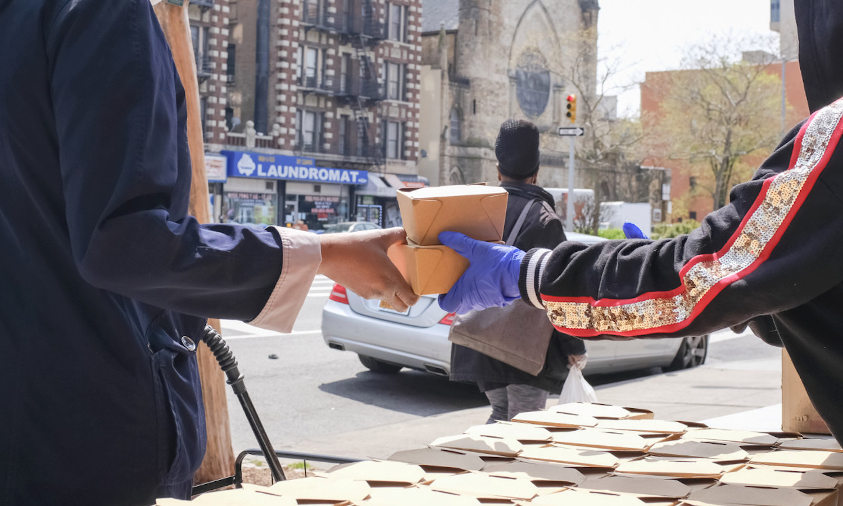Rethink Food is working to help restaurants stay open while feeding the communities hardest hit by the COVID-19 pandemic. The Brooklyn-based nonprofit, which recovers excess food from restaurants and grocery stores, launched several emergency programs to create jobs and distribute meals to people in need.
“We saw the restaurants around us folding left and right. That’s not only a major source of food for us, but it’s also our community,” Rethink Executive Director Megan Savage tells Food Tank.
The nonprofit’s new Restaurant Response Program provides 30 New York City restaurants with grants of up to US$40,000. The funding allows neighborhood eateries like Collective Fare to reopen their doors and create thousands of meals for underserved communities and workers on the frontlines of the pandemic.
With support from Rethink, Collective Fare is providing over 800 meals for the community daily. “It’s extremely important for us to work with restaurants along the entire spectrum,” Savage says. “We are not working with just mid- and high-level restaurants, it’s about the small mom and pop shops [keeping up] the culture and melting pot of New York.”
Collective Fare, a catering company which serves Afro-fusion cuisine in one of Brooklyn’s most impoverished neighborhoods, lost thousands of dollars in revenue to the pandemic. Although the company was unsure where to turn, they knew they wanted to help local residents. “Laying off our workers wasn’t an option, closing wasn’t an option, and abandoning the community wasn’t an option at all,” Collective Fare Co-Founder and Director of Operations LaToya Meaders tells Food Tank.
Another of Rethink’s programs, the Chinatown/LES Food Initiative, manages emergency food distribution in Chinatown, a Manhattan neighborhood hard hit by the pandemic. With only 15 percent of the area’s roughly 270 restaurants open, residents, especially the elderly, face economic hardship and limited food access. The new program uses donated specialty foods from local purveyors like South East Asia Market LLC (SEA) to prepare thousands of meals, which volunteers distribute door-to-door.
Meanwhile, at Rethink’s new donation-based cafe, a registered soup kitchen in Brooklyn, professional chefs prepare restaurant-quality meals for anyone in need. Visitors can also pick up staple grocery items such as dairy, eggs, bread, and fresh produce for a suggested donation of US$5. “It looks and feels like a cafe that anyone would want to come in and grab a meal,” Savage tells Food Tank. “We want to bring dignity back to those experiencing food insecurity.”
With help from Rethink, chef Daniel Humm launched a similar initiative at his Michelin Star restaurant, Eleven Madison Park, in Manhattan. Humm rehired his staff to transform the dining room into a commissary kitchen for Rethink. The chef and his team are turning out thousands of meals daily for frontline hospital workers and clients of Citymeals on Wheels.
While Rethink’s relief efforts currently focus on New York City, Savage and her team are seeking federal support to expand the program nationally. The nonprofit currently relies on donations and corporate partnerships to fund its operations. With funding from the Federal Emergency Management Agency (FEMA), Rethink aims to build a coalition of restaurants willing to adopt their model. “We’re looking for [restaurants] to live by and adhere to these sustainable practices and health protocols especially in times of crisis,” Savage tells Food Tank.
Although 40 percent of the nation’s food goes to waste, more than 37 million Americans are still food insecure. Rethink hopes to address this disparity by changing the perception of waste, one rescued meal at a time. Since March, the nonprofit has recovered nearly 300 thousand kilograms of food and served roughly half a million meals.
“COVID-19 is shedding light on the flaws in our food system,” says Savage. “There’s enough to feed everyone, but the system is broken. It’s up to us to fix it and there’s no better time than now to get it right.”
Photo courtesy of Rethink Food





